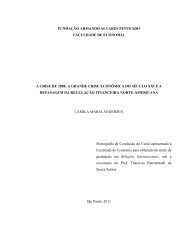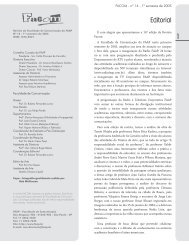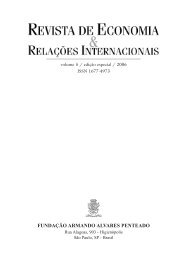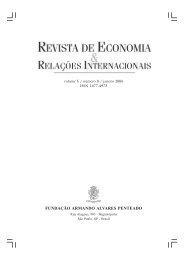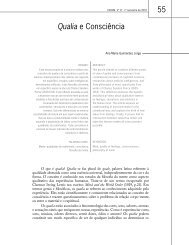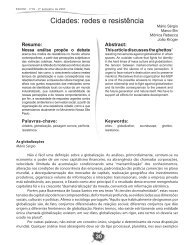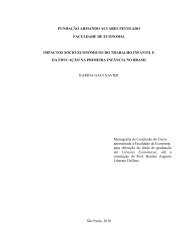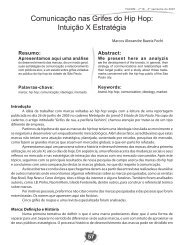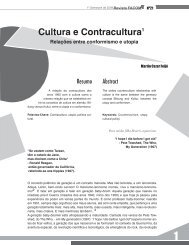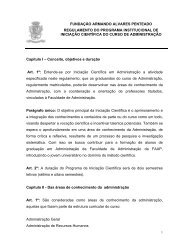Guia de Estudos - Faap
Guia de Estudos - Faap
Guia de Estudos - Faap
Create successful ePaper yourself
Turn your PDF publications into a flip-book with our unique Google optimized e-Paper software.
<strong>Guia</strong> <strong>de</strong> <strong>Estudos</strong> / Study Gui<strong>de</strong> / <strong>Guia</strong> <strong>de</strong> Estudios<br />
The advantage of South-South cooperation, when<br />
comparing it to North-South cooperation is a greater<br />
capacity of the receiving country to generate an appropriation<br />
sense; it promotes initiatives that are closer to<br />
the conditions and needs of the receiving country, and it<br />
allows a greater sensibility to some contexts, due to the<br />
familiarity with the reality and the problems of <strong>de</strong>velopment;<br />
it creates a ”win win” scenario, since it improves<br />
technical and institutional abilities to both parties. It allows<br />
a larger flexibility and adaptation of changing conditions<br />
of the benefited country; for not being connected<br />
to conditions or obligations of assisted purchases, it<br />
is conclu<strong>de</strong>d faster, and it is cheaper. Frequently it is given<br />
to countries that are “abandoned” by the traditional<br />
donators and tends to preserve the cultural diversity<br />
and i<strong>de</strong>ntity of the benefited countries. These are some<br />
reasons, along with contributing to the innovations of<br />
some sectors, the increase of the diversity of actors,<br />
along with the opening of new channels of communication<br />
and ways of learning, ma<strong>de</strong> the countries and the<br />
OCDE give more space to South –South cooperation.<br />
The transformation itself is the result of the increasing<br />
weight of emerging countries, the opportunities created by<br />
the international crisis, the search for solutions among <strong>de</strong>veloping<br />
countries and the ten<strong>de</strong>ncy to ‘retreat from traditional<br />
donors’ which has open space for the offer of cooperative CSS,<br />
reducing monopolies in the provision of aid.<br />
As said before, the financial crisis shook the financial<br />
system damaging the flux of resources <strong>de</strong>stined to international<br />
cooperation. However, some of these countries,<br />
<strong>de</strong>veloping countries, did well in comparison with<br />
others during the crisis. This happened due to their internal<br />
structure, like in the case of Brazil, that has very<br />
strict bank and financial systems. According to the report,<br />
MDG after the crisis,<br />
a key lesson from the financial crisis is that the economic<br />
and social impact of the downturn would have been<br />
far worse if not for the effective – and often extraordinary<br />
– policy response adopted by many advanced, emerging,<br />
and <strong>de</strong>veloping countries, as well as the swift and sizable assistance<br />
provi<strong>de</strong>d by international financial institutions and<br />
multilateral <strong>de</strong>velopment bank. Policy responses and international<br />
cooperation have been better than previous crises.<br />
According to the same report, the crisis hit two critical<br />
drivers of the progress toward the MDGs, faster growth<br />
and better service <strong>de</strong>livery. The impact was negative be-<br />
cause of the gravity of the recession and the indicators<br />
of human <strong>de</strong>velopment started to <strong>de</strong>cline much in bad<br />
times then growing in good times. But comparing to<br />
the other crises many countries have maintained social<br />
safety net in the face of income <strong>de</strong>cline, and this is why<br />
the impact on the MDGs are not so hard.<br />
The international community respon<strong>de</strong>d strongly to<br />
the crises, trough the use of the multilateral <strong>de</strong>velopment<br />
banks that protect core <strong>de</strong>velopment programs,<br />
strengthen the privet sector, and support poor households.<br />
However even with a good crises recover, the<br />
MDG´s are still in a bad situation, and to get recovered<br />
from this situation it is necessary that the <strong>de</strong>veloping<br />
countries maintain good polices and effective service<br />
<strong>de</strong>livery with the global community support.<br />
The fact that countries like Brazil, lower income and<br />
upper middle income that had suffered with economic<br />
crisis throughout their histories to receive financial aid<br />
of the IMF, had to follow some strict rules, <strong>de</strong>manding<br />
structural changes, allowed the country to mold a structure<br />
capable of creating a system relatively immune to<br />
future crisis.<br />
Another point that must be mentioned is that with<br />
a bigger presence of International Organizations, focusing<br />
financial <strong>de</strong>velopment, such as the IMF, the World<br />
Bank Group and the UNDP, low income countries and<br />
lower middle income, to continue receiving aid from<br />
the financial, technical and know how cooperation, had<br />
to adjust themselves and follow a mold to <strong>de</strong>velop correctly,<br />
thus going from low income to lower middle income<br />
for example. The fact that the MDGs have 15 years<br />
to be achieved, and even if it is not, ma<strong>de</strong> poor countries<br />
start creating solid structures so that they could reach<br />
an a<strong>de</strong>quate <strong>de</strong>velopment pattern in the future.<br />
This allows these countries to form a structure capable<br />
of receiving investments, financial resources and to<br />
go from receptors to donors in the international cooperation.<br />
This process makes global partnership solidify<br />
itself, ever expanding the possibility to reach the MDGs<br />
(the report says that “the financial conditions are improving,<br />
but financial flows remains below the needs”.<br />
Proving that the structures are being built correctly,<br />
through financial cooperation and programs of <strong>de</strong>velopment<br />
banks, showing that to overcome the crisis it<br />
is necessary that there is trust in the markets and the<br />
strengthening of the international cooperation policy.<br />
121




